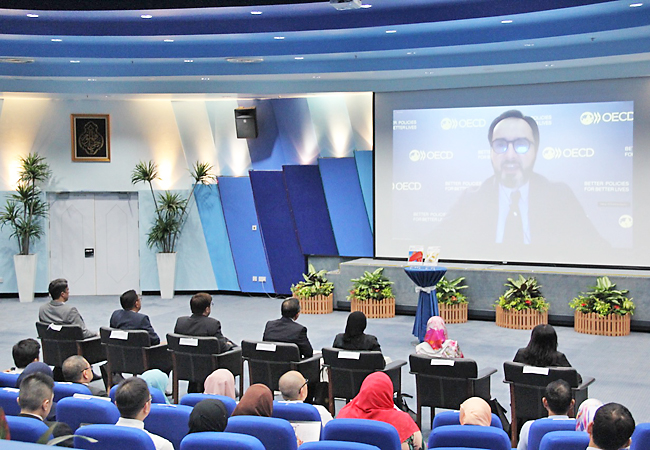Azlan Othman
Pro-competition laws and regulations can contribute to the efficient functioning of the logistics sector in the Sultanate, in support of the country’s efforts to diversify the economy towards a sustainable economic growth in the long-run, said the Competition Commission of Brunei Darussalam (CCBD) in a press statement yesterday.
The CCBD and the Organisation for Economic Cooperation and Development (OECD) launched two reports on competition assessment of the logistics sector – Competition Assessment Reviews of Logistics Sector in Brunei Darussalam and Competitive Neutrality Reviews of Small Package Delivery Services in Brunei Darussalam – as the outcome of an independent study by the OECD as part of the ASEAN Competition Action Plan 2016-2025.
The action plan provides strategic goals, initiatives and outcomes to fulfil the competition-related vision of the ASEAN Economic Community (AEC) Blueprint 2025. The study, funded by the UK Prosperity Fund, aims to foster competition in the logistics sector in the Southeast Asian region.
The launch of the reports highlighted the findings and recommendations that promote a pro-competition environment in the logistics sector, while providing a platform for relevant stakeholders to engage and discuss the recommendations provided by the OECD.
Meanwhile, the launch was opened by CCBD Chairperson and Legislative Council member Yang Berhormat Nik Hafimi binti Abdul Haadii, during which she highlighted the aim of the competition policy and law in promoting a level playing field for business players to deliver optimal economic outcomes.
The effective enforcement of competition law deters harmful anti-competitive practices and open doors for more business opportunities and better choices of goods and services at more competitive pricing for consumers, she said.

However, Yang Berhormat Nik Hafimi added, policy and law cannot work in isolation and must be complemented by other related policies, and thus, the need for complementary efforts from the sector’s regulators.
British High Commissioner to Brunei Darussalam John Virgoe, Acting Head of the OECD Competition Division Antonio Capabianco and Head of Competition, Consumer Protection & IPR of the ASEAN Secretariat Looi Teck Kheong also delivered remarks at the event.
Permanent Secretary at the Ministry of Transport and Infocommunications (MTIC) Haji Mohammad Nazri bin Haji Mohammad Yusof, in his keynote speech, underscored the importance of effective competition in developing an efficient logistics sector. When markets function well, consumers can choose between different providers of goods or services, and firms are incentivised to compete, innovate more, and be more productive. Despite the relatively small share of 1.7 per cent of logistics in the country’s gross domestic product (GDP) in 2019, the logistics sector nonetheless plays a vital part in achieving economic development and diversification by enabling international trade and enhancing connectivity.
The MTIC Strategic Plan 2025 has a vision of “Connected Smart Nation” where technology and connectivity are to be the catalyst to growth through improved competitiveness by developing infrastructure, innovation, data capability, human capital and other resources.
Two of the key strategic objectives – ensuring the sustainability of transport and infocommunications sectors, and ensuring healthy competition through policy and regulatory framework conducive to investment and businesses – are directly linked to logistics as well as competition.
The MTIC has also undertaken the initiative to form the Brunei Logistics and Transshipment Task Force (BLTTF) in 2020 to further facilitate active engagement and interaction between government and businesses to improve the logistics and value chain eco-system.
Haji Mohammad Nazri applauded the initiative of ASEAN and the CCBD in fostering competition in the logistics sector under the ASEAN Competition Action Plan.
The Report on Competition Assessment reviewed 63 relevant laws and regulations that can limit competition in the logistics sector with a focus on, including freight transportation, freight forwarding, and small-package delivery services. The Report on Competitive Neutrality assessed six relevant laws and regulations related to the impact of State-Owned Enterprises (SOEs) and the application of competitive neutrality on Small-Package Delivery Services.
A total of 66 recommendations from the two reports are provided to support reforms to develop a competitive logistics sector, which is a fundamental building block in the efforts to diversify the country’s economy by increasing competitiveness, investments and productivity, towards achieving the goal of a dynamic and sustainable economy as inspired under Brunei Vision 2035.
The details of the findings and the non-binding recommendations of the reports were presented by the competition experts and analysts from the OECD.
Head of South and Southeast Asia Division at OECD Global Relations Alexander Boehmer highlighted the importance of the event in advocating for competition principles in the ASEAN region and fostering global value chain, adding that close consultation with the business community is crucial in formulating policies.
The two reports were handed over by the CCBD Chairperson to the Permanent Secretary at the MTIC in the Theatre Hall of the Ministry of Finance and Economy building in a hybrid setting to allow participation of both physical and virtual audience. Physical participation from domestic audience consisted of commission members of the CCBD, officials from sector regulator and government agencies. Meanwhile, competition authorities from the ASEAN member states, representatives from the ASEAN Secretariat, and the OECD team based in Paris, France participated in the event virtually.